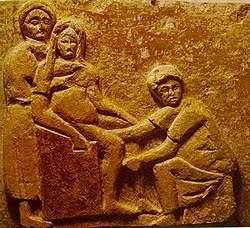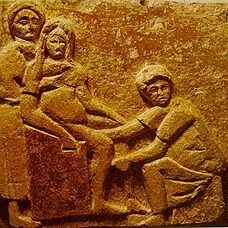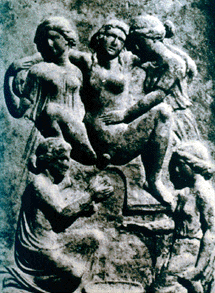Bilhah and Zilpah were the handmaidens (servants) of the patriarch Jacob’s wives, Leah and Rachel. Rachel, who was Jacob’s favorite wife, had not been blessed with children. While Leah, Rachel’s older sister, had given birth to four sons. Genesis 30 records that,
“…when Rachel saw that she bare Jacob no children, Rachel envied her sister; and said unto Jacob, Give me children, or else I die. And Jacob’s anger was kindled against Rachel: and he said, Am I in God’s stead, who hath withheld from thee the fruit of the womb? And she said, Behold my maid Bilhah, go in unto her; and she shall bear upon my knees, that I may also have children by her.”
In her desperation for children Rachel followed the example of Sarah, the wife of Abraham, and married her maid Bilhah to her husband so that she could have children through her. In Old Testament times this was an acceptable way for a married woman who was barren to gain children. In an ancient Nuzi marriage contract it stipulated that a woman whose servant bore the children of her husband “should have full authority over the offspring.” (Source) This adoption ceremony was often conducted by placing the son or daughter on the knees of the mistress and declaring it her child. This may have been what Rachel meant when she said that Bilhah “shall bear upon my knees.” Alternatively she may have just been referring to the way in which ancient women commonly gave birth. Women in labor were surrounded by female companions who encouraged them to labor upright and dance and sway during contractions (belly dancing is actually an ancient fertility dance that women were taught a young age to help with conception and labor). During the final stage of labor a woman would squat and be supported under the arms by one or two other women. Often times bricks were placed under her to give her more support and the midwife knelt in front of her. This image of a woman being supported in a squat by other women is the most common image of women giving birth throughout history and around the world. So when Rachel meant that Bilhah would bear upon her knees she may have been referring to the actual position in which she would give birth.  Image Source
Image Source
Either way it is almost certain that Rachel would have been with Bilhah during the births of her two sons. Also, the scriptural text seems to indicate that the sons Bilhah bore were considered to be Rachel’s and that she would have raised them as her own. This is reinforced by the fact that Rachel named both of the sons Bilhah bore. The first son Rachel named Dan saying, “God hath judged me, and hath also heard my voice, and hath given me a son.” The second son Bilhah bore she named Naphtali and said, “With great wrestlings have I wrestled with my sister, and I have prevailed.”After Bilhah bore Rachel two sons Leah found that even though she already had four sons she was no longer able to have children. So following the example of her sister Leah gave her maid, Zilpah, to Jacob as a wife so that she could have more children. Zilpah bore Leah two sons. Leah named the first son Gad and declared, “A troop cometh.” The second son Zilpah bore Leah named Asher and said, “Happy am I, for the daughters will call me blessed.” Like Rachel, the sons that Zilpah bore would have been considered to be Leah’s and she would have raised them as her own sons. Nonetheless Bilhah and Zilpah would have been able to see their sons every day and their sons would have know that they were their birth mothers. In the official record given of Jacob’s children in Genesis 46 Dan and Naphtali are listed as the children of Bilhah and Asher and Gad are listed as the children of Zilpah. These women may not have had legal claim to their children but they still played a large part in their upbringing and in their daily lives. As I’ve thought about these two great women and reflected on their sacrifices I can’t help but marvel at what amazing women these two handmaidens must have been. It makes me wonder what sort of relationship Rachel and Leah had with them. What did it take for them to share their husband with two other women? What did it take for Bilhah and Zilpah to share their children with two other women? It must have been hard, really hard. Yet they did it and through them came the 12 tribes of Israel… the covenant family of the whole earth. These two handmaidens, Bilhah and Zilpah, made great sacrifices. Probably the greatest sacrifice that any mother could ever make. Yet they did it out of love–love for Rachel and Leah, knowing that they could given them something they could not get themselves. Love for their sons, knowing that they were giving them the best position, name, and quality of life possible in their situation. Their sacrifice reminds me of all the women who make similar sacrifices around the world today. All the Bilhahs and the Zilpahs who still selflessly give of themselves to bring children to women who are unable to have them any other way… and all the Rachels and the Leahs who will never be able to repay the gift.Questions To Think About:
- How is this ancient form of adoption similar or different from today’s form? Do you think it would be harder or easier?
- Why do you think it is that both Rachel and Leah go on to have their own children after they gain sons, by adoption, through Bilhah and Zilpah? Do you think that they just got impatient and that they would have eventually had their own children, or do you think that this was the way God intended for His children to come?
- What is significant about the names Rachel and Leah give their sons?
- How do you think that this story might be valuable to women making the choice to adopt a child or to put a child up for adoption?









Wow,what an interesting post. I was thinking about this subject of surrogacy.I recently re-read the record of Jacob and his wives. I heard a teaching comparing the relationship of Jacob and Esau and the stolen birthright, with the relationship of Leah and Rachael. Leah was the oldest daughter in lieu of an elder brother. What was her birthright, to marry first,receive her dowery and be fruitful and multiply. She was the first wife, but it seems that history has made her a litte shrewish, maybe less attractive. Was it the custom for the first wife to have more children than the 2nd wife? How hard it must have been to be an un-loved wife.
Genesis 29:31 When the LORD saw that Leah was unloved, He opened her womb; but Rachel was barren.
I hope that for all of the sibling rivalry,the sisters at least loved each other.
I found this article concerning surrocacy with a mother and daughter:
"A mother's love takes many forms. For Kristine Casey, 61, it meant giving the gift of motherhood to her infertile daughter by carrying and giving birth to her own grandson.
With the help of hormone supplementation, Casey, who had gone through menopause 10 years earlier, became pregnant during her second round of in vitro fertilization, the Chicago Tribune reported. She carried full term and gave birth via Cesarean section to Finnean, her first grandchild, …."
I have to say that when I hear of the positive results of agreements between women, for one to bear anothers child and then give that child to her,with love,I can see the love of our Heavenly Father. What a great plan.
King James Version of the Bible. Genesis 29:31 "And when the Lord saw that Leah was hated, he opened her womb: but Rachel was barren." The Hebrew word sahnay does not mean “hate” as the term is used today, but rather conveys the idea of “loving less.” A better translation would be, “when the Lord saw that Leah was loved less or was not as favored,” he opened her womb.
This is really an interesting conflict in the bible. I recently taught this to my seminary students. Jacob of course only wanted to marry Rachel, and worked for 7 years to do so, only to be tricked by his uncle, Laban. The only reason Leah had more children was because she was fertile, while Rachel was barren. Even at one point, it was obvious that Leah thought she would have no more children…Jacob was staying in Rachel's tent and no where else. They made a deal over the mandrakes "love fruit"…remember that in the scriptures? Anyway, Rachel said that Jacob would go to Leah if Rachel could have the mandrakes that Reuben brought back. Leah went on to have 3 more children from that. If Rachel had not been barren, she would have most likely had the most children. But dying in childbirth with Benjamin ended that.
RGG, I'll agree that this is a super interesting story. It really does amaze me how the Lord has different experiences planed for each of us. He could have opened Rachel's womb… he does later… but perhaps these women needed to learn these lessons first.
Wow, and what a crazy story about a 61 year old woman giving birth to her grandson… that is really strange! I guess God works in mysterious ways.
I like your take on it, but I guess it always seemed like Bilhah and Zilpah didn't have any choice. Since they were servants it wasn't really like they could say no, right? I really do like the way you've likened it to modern day adoption . . . but doesn't it seem more like two women fighting with each other about who has the most children, forcing their handmaids to lay with their husband, and then claiming their servant's children? I don't know . . . I guess I always felt bad for Bilhah and Zilpah because it didn't really seem like they had any say in the matter.
On the other hand, I know the scriptures don't always give us the whole story and maybe the two servants agreed to this whole thing. At the same time I know that it's hard to understand things that occurred in a different culture. Something that sounds weird and wrong to me now might have made perfect sense in their day.
Whether or not they had any say in the matter, I do think you point out a really good point. No matter what the circumstances in which they had the children, they had to have had incredible strength to raise those children in those circumstances. All four of those women had to have had crazy patience and understanding to make it in that situation.
With Bilhah and Zilpah, it wasn't a forced issue, it was more of a 'that's what they did in those days' issue. This was a normal thing for concubines. Just like Sarai/Sarah gave her handmaid, Hagar, to Abraham to have children on behalf of Sarai/Sarah, These handmaids were basically considered 'surrogates' if you will, for lack of a better word. Their children were considered Leah's and Rachel's. But the son's that were the most important were the ones that had the birthright, which was Reuben, Leah's firstborn, until he slept with Bilhah…then lost that birthright and then it went to Joseph, Rachel's firstborn.
I agree too that these women had an understanding in the bigger picture and what was important…